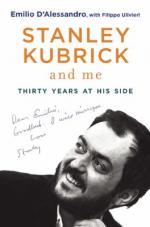- Audiobooks
- Books
- E-books
- Connect Your Summer
- May We Suggest
- Suspense
- film
- producers
- revenge
- loneliness
- American history
- American Revolution
- College Football
- Florida State University
- cultural history
- psychological thrillers
- Biography
- History
- Mystery
- Sports
May 28, 2016 | madame librarian
Canton Public Library's CONNECT YOUR SUMMER reading program kicks of this month. Any of these selections could earn the YOU CHOOSE badge.
"Both dispatch and dissertation, NPR contributor Diane Roberts, an English professor at Florida State University, gives a insider's account of a big time college football program in the midst of controversy, while examining the impact and legacy of the sport's popularity in America today"--.
"This intimate portrait by his former personal assistant and confidante reveals the man behind the legendary filmmaker--for the first time. Stanley Kubrick, the director of a string of timeless movies from Lolita and Dr. Strangelove to A Clockwork Orange, 2001: A Space Odyssey, Full Metal Jacket, and others, has always been depicted by the media as the Howard Hughes of filmmakers, a weird artist obsessed with his work and privacy to the point of madness. But who was he really? Emilio D'Alessandro lets us see. A former Formula Ford driver who was a minicab chauffeur in London during the Swinging Sixties, he took a job driving a giant phallus through the city that became his introduction to the director. Honest, reliable, and ready to take on any task, Emilio found his way into Kubrick's neurotic, obsessive heart. He became his personal assistant, his right-hand man and confidant, working for him from A Clockwork Orange until Kubrick's death in 1999. Emilio was the silent guy in the room when the script for The Shining was discussed. He still has the coat Jack Nicholson used in the movie. He was an extra on the set of Eyes Wide Shut, Kubrick's last movie. He knew all the actors and producers Kubrick worked with; he observed firsthand Kubrick's working methods down to the smallest detail. Making no claim of expertise in cinematography but with plenty of anecdotes, he offers a completely fresh perspective on the artist and a warm, affecting portrait of a generous, kind, caring man who was a perfectionist in work and life. "--.
"What should be a cozy and fun-filled weekend deep in the English countryside takes a sinister turn in Ruth Ware's suspenseful, compulsive, and darkly twisted psychological thriller. Leonora, known to some as Lee and others as Nora, is a reclusive crime writer, unwilling to leave her "nest" of an apartment unless it is absolutely necessary. When a friend she hasn't seen or spoken to in years unexpectedly invites Nora (Lee?) to a weekend away in an eerie glass house deep in the English countryside, she reluctantly agrees to make the trip. Forty-eight hours later, she wakes up in a hospital bed injured but alive, with the knowledge that someone is dead. Wondering not "what happened?" but "what have I done?", Nora (Lee?) tries to piece together the events of the past weekend. Working to uncover secrets, reveal motives, and find answers, Nora (Lee?) must revisit parts of herself that she would much rather leave buried where they belong: in the past. In the tradition of Paula Hawkins's instant New York Times bestseller The Girl On the Train and S. J. Watson's riveting national sensation Before I Go To Sleep, this gripping literary debut from UK novelist Ruth Ware will leave you on the edge of your seat through the very last page"--.
From the New York Times bestselling author of In The Heart of the Sea and Mayflower comes a surprising account of the middle years of the American Revolution, and the tragic relationship between George Washington and Benedict Arnold. In September 1776, the vulnerable Continental Army under an unsure George Washington (who had never commanded a large force in battle) evacuates New York after a devastating defeat by the British Army. Three weeks later, near the Canadian border, one of his favorite generals, Benedict Arnold, miraculously succeeds in postponing the British naval advance down Lake Champlain that might have ended the war. Four years later, as the book ends, Washington has vanquished his demons and Arnold has fled to the enemy after a foiled attempt to surrender the American fortress at West Point to the British. After four years of war, America is forced to realize that the real threat to its liberties might not come from without but from within. Valiant Ambition is a complex, controversial, and dramatic portrait of a people in crisis and the war that gave birth to a nation. The focus is on loyalty and personal integrity, evoking a Shakespearean tragedy that unfolds in the key relationship of Washington and Arnold, who is an impulsive but sympathetic hero whose misfortunes at the hands of self-serving politicians fatally destroy his faith in the legitimacy of the rebellion. As a country wary of tyrants suddenly must figure out how it should be led, Washington's unmatched ability to rise above the petty politics of his time enables him to win the war that really matters.
"You can be lonely anywhere, but there is a particular flavor to the loneliness that comes from living in a city, surrounded by thousands of strangers. The Lonely City is a roving cultural history of urban loneliness, centered on the ultimate city: Manhattan, that teeming island of gneiss, concrete, and glass. What does it mean to be lonely? How do we live, if we're not intimately involved with another human being? How do we connect with other people, particularly if our sexuality or physical body is considered deviant or damaged? Does technology draw us closer together or trap us behind screens? Olivia Laing explores these questions by travelling deep into the work and lives of some of the century's most original artists, among them Andy Warhol, David Wojnarowicz, Edward Hopper, Henry Darger and Klaus Nomi. Part memoir, part biography, part dazzling work of cultural criticism, The Lonely City is not just a map, but a celebration of the state of loneliness. It's a voyage out to a strange and sometimes lovely island, adrift from the larger continent of human experience, but visited by many - millions, say - of souls"--.





